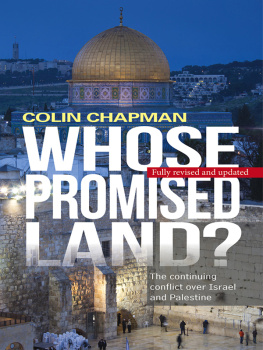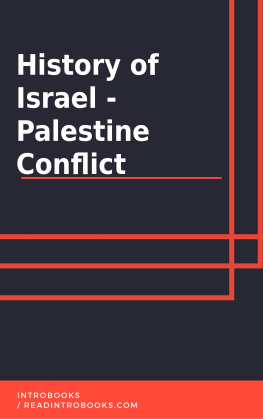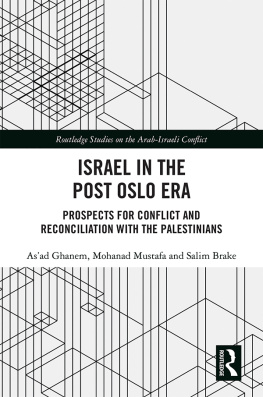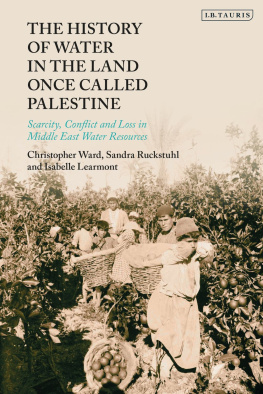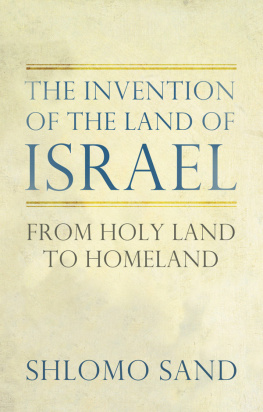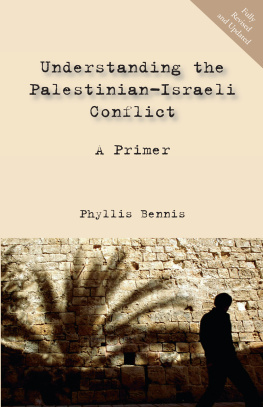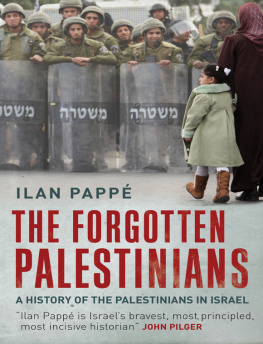WHOSE PROMISED LAND?
When first published, this book influenced thousands with its balanced, thoughtful, and Bible-based assessment of the situation in IsraelPalestine. Sadly, occupation and settlement have continued and deepened in Palestine over the last dozen years, and talks about a just peace have stumbled. So an update is long overdue. With this brand new edition Colin Chapman does not disappoint. This remains the go-to text for those wanting to understand what is really happening in the Middle East.
Jeremy Moodey , Chief Executive, Embrace the Middle East
In this book, Colin Chapman presents a clear and emphatic response to Christian Zionism, presenting a well-researched and clearly set out Christian interpretation of relevant passages both from the New Testament and the Hebrew scriptures. The historical background of the opening chapter in particular, while presenting the tragedies and despair, is a good and honest attempt at balance, even though, as he himself admits, it is impossible to reconcile two distinct historical narratives to all satisfactions.
Some of his theological conclusions in particular are contentious, and there are some who will want to interrogate the implications further. However, Colin Chapman has long been acknowledged as providing a strong intellectual voice to Christian concern for Palestinians, and this book will undoubtedly reinforce that.
Dr Jane Clements , Director, Council of Christians and Jews
For a more than a generation, Colin Chapmans Whose Promised Land? has been the premier volume for Christians who are trying to think Christianly about the conflict in IsraelPalestine. And this new edition is a helpful update and improvement in his already-outstanding presentation.
The strength of Chapmans work is not only in its comprehensiveness, but in its fairness. Unlike most scholars, he sites his sources extensively, letting political leaders and theologians speak for themselves, so that the reader can make his or her own judgments about the meaning of their words.
This is simply an essential book that ought to be in the hands of every thoughtful Christian who cares about the world, the Middle East, and the Bible.
Gary M. Burge , PhD, Wheaton College & Graduate School, author of Jesus and the Land: The New Testament Challenge to Holy Land Theology (SPCK)
I am delighted that Whose Promised Land? has been brought up to date in this new edition. For over thirty years this one book has stood out as the seminal work on this highly contested issue. Not only does it bring together all the essential documents from recent history but it also keeps posing the necessary, hard questions which can help would-be followers of Jesus use the Bible appropriately applying biblical truth to the Land of the Bible. Let this book challenge your pre-conceptions and move you to pray, as Jesus did, for the peace of Jerusalem his peace his land.
This really is the must-have book on one of the worlds hottest topics.
Dr Peter Walker , Professor of Biblical Studies, Trinity School for Ministry, USA, and author of In the Steps of Jesus and The Story of the Holy Land (both Lion Hudson)
COLIN CHAPMAN
WHOSE PROMISED LAND?
The continuing conflict over Israel and Palestine

To Anne
Jeremy, Andrew and Sarah
Text copyright 2015 Colin Chapman
This edition copyright 2015 Lion Hudson
The right of Colin Chapman to be identified as the author of this work has been asserted by him in accordance with the Copyright, Designs and Patents Act 1988.
All rights reserved. No part of this publication may be reproduced or transmitted in any form or by any means, electronic or mechanical, including photocopy, recording, or any information storage and retrieval system, without permission in writing from the publisher.
Published by Lion Books
an imprint of
Lion Hudson plc
Wilkinson House, Jordan Hill Road,
Oxford OX2 8DR, England
www.lionhudson.com/lion
ISBN 978 0 7459 7025 7
e-ISBN 978 0 7459 7026 4
First edition 2002
Picture Acknowledgments
Cover image: Jerusalem, Old City Walter Bibikow/Getty
All maps (bar 17a and 17b) by Derek West.
1.11a adapted from Walid Khalidi, From Haven to Conquest: Readings in Zionism and the Palestine Problem Until 1948 (edited with introduction) Beirut: Institute for Palestine Studies, 1971, p. 94
1.11b, 1.12, 1.13, 1.17a and 1.17b adapted from Martin Gilbert, Israel: A History, Doubleday, 1998, pp. 622, 623, 629, 657, 648, copyright 1998 Martin Gilbert.
Maps 17a and 17b (pp. 4445) taken from The ArabIsraeli Conflict by Ian Bickerton, copyright 2012 Ian Bickerton.
Used by permission of Continuum International Publishing Group.
Text Acknowledgments
Scripture quotations taken from Holy Bible, New International Version Anglicised. Copyright 1979, 1984, 2011 Biblica, formerly International Bible Society. Used by permission of Hodder & Stoughton Ltd, an Hachette UK company. All rights reserved. NIV is a registered trademark of Biblica. UK trademark number 1448790.
All quotations marked NRSV are from The New Revised Standard Version of the Bible copyright 1989 by the Division of Christian Education of the National Council of Churches in the USA. Used by permission. All rights reserved.
Quotations marked Revised Standard Version 1946, 1952 and 1971 by the Division of Christian Education of the National Council of Churches in the USA. Used by permission. All rights reserved.
Quotations marked New English Bible Oxford University Press and Cambridge University Press 1961, 1970.
Quotations marked Revised English Bible Oxford University Press and Cambridge University Press 1989.
Quotations marked Todays English Version 1994 published by the Bible Societies/HarperCollins Publishers Ltd UK, Good News Bible American Bible Society 1966, 1971, 1976, 1992. Used with permission.
A catalogue record for this book is available from the British Library
Contents
About the author
Colin Chapman was brought up in Scotland and studied at St Andrews University and London Bible College before training at Ridley Hall, Cambridge, for ordination in the Anglican Church. After working for three years as an assistant minister in a church in Edinburgh, he went to Egypt with the Church Mission Society, where he was on the staff of the Anglican Cathedral and taught at the Coptic Evangelical (Presbyterian) Seminary. From 1975 to 1983 he worked with the International Fellowship of Evangelical Students as Regional Secretary for Islamic Lands, based in Beirut. Returning to the UK he taught the Study of Mission and the Study of Religion at Trinity College, an Anglican seminary in Bristol, and from 1990 to 1997 was Principal of Crowther Hall, the training college of the Church Mission Society in Selly Oak, Birmingham. From 1999 to 2003 he taught Islamic Studies at the Near East School of Theology in Beirut. His wife, Anne, worked with the Church Mission Society as a nurse in Jordan before they were married, and they are now enjoying semi-retirement in Cambridge, England.
His books include: Christianity on Trial (Lion Books, 197173), The Case for Christianity (Lion Books, Tyndale, 1981), Cross and Crescent: Responding to the challenges of Islam (IVP UK and USA, 1988 and 2007), Islam and the West: Conflict, co-existence or conversion? (Paternoster, 1998), and Whose Holy City? Jerusalem and the Israeli-Palestinian Conflict (Lion Books and Baker, 2004).
Preface to the 2015 Revision
How can a book first published in 1983 and revised most recently in 2002 deserve to be updated and republished in 2015?
It seems to have met a need as an introduction to the IsraeliPalestinian conflict from a Christian perspective. Its been different from other books on the subject in that it seeks to address both the history and the politics and questions of religion with a special focus on the different ways in which Christians interpret the Bible.

